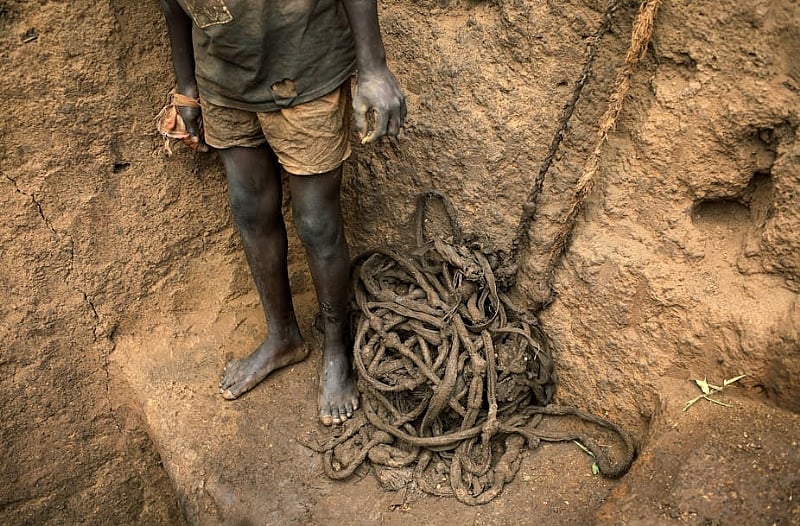Weather-induced disasters that are the result of climate change are increasingly affecting societies. One area that hasn’t been explored much yet is how extreme weather events are creating conditions for a rise in modern slavery.
Legal scholar Daniel Ogunniyi, who has done research in this field, speaks about the intersection of climate change and modern slavery in Africa.
What is modern slavery and how serious is it in Africa?
Unlike its historical variant, modern slavery is not a legal term with a precise definition. It is widely used to speak of practices like forced labour, human trafficking, servitude and de facto slavery. It is often underpinned by involuntary action, control and exploitation. Forced marriage, forced begging and descent-based slavery, which are common in many African countries, may also fit modern slavery. Descent-based slavery refers to situations in which people are born into slavery. It is often passed down the maternal line and usually occurs because the victim’s ancestors were captured at some point by slave-owning families. Descent-based slavery is still practised in Chad, Mali, Mauritania, Niger and Sudan.
Thus, modern slavery is not limited to trade in human beings or the shackling of individuals.
The International Labour Organisation estimates that some 50 million individuals are caught up in forms of modern slavery today. Africa accounts for around 7 million of the global estimates. It’s prevalent throughout Africa and manifests itself more strongly in some countries than others. They include Eritrea, Mauritania and South Sudan. Mauritius, Lesotho and Botswana have the lowest prevalence of modern slavery in Africa.
Research suggests that of these, some 3.8 million people toil in forced labour in Africa. Many work in the agriculture, fishing, mining and domestic sectors. And it’s estimated that 3.2 million people in Africa are trapped in forced marriage.
Human traffickers also prey on the economic vulnerabilities in many African countries by offering false employment. Many victims endure long and arduous labour, sexual exploitation and abuse without any hope of change.
The practices that can be described as modern slavery have historically been driven by a variety of factors. Poverty, armed conflict and political instability are some of them. More recently, climate change has emerged as a factor.
How is climate change contributing to modern slavery in Africa?
In many instances, climate change intensifies existing structural barriers and socioeconomic conditions that expose victims to exploitation. Climate change does not affect societies in isolation; it worsens pre-existing inequalities, vulnerabilities and systems of power. Communities that are already disadvantaged due to poverty, limited access to resources, or poor infrastructure are likely to experience more severe impacts from climate change.
Extreme weather events such as flooding, drought, wildfires, water scarcity and rise in sea levels driven by climate change are creating loss of livelihoods. They also displace people and make them more vulnerable. In turn, these factors make people more susceptible to modern slavery.
As livelihoods diminish because of climate change, violent extremist groups and organised criminal networks have preyed on the vulnerable. Terrorist groups such as Boko Haram and al Shabaab have used victims in combat operations or held them in sexual slavery, for instance. Also, families are offsetting the economic effects of climate change by marrying off their children in exchange for dowry and bride price.
In Ghana, human trafficking and labour exploitation have been associated with migration from the north to the country’s south in times of drought.
As a result of climate change shocks, some families in Ghana are forced to sell their children to labour agents who exploit them. Also, some of the women and girls who migrate to the country’s south in search of better conditions work as kayayie (porters). This is a scheme in which trafficked young women work under exploitative conditions.
What should be done to stop modern slavery in Africa?
First, governments must adopt and enforce strong laws that align with international standards. Such laws include the ILO Forced Labour Convention of 1930. It calls on ratifying states to criminalise forced labour. Another is the Palermo Protocol adopted in 2000. It criminalises human trafficking and provides a framework for protecting and assisting victims.
Second, African states must develop stronger collaboration at regional and international levels to address the transnational aspect of modern slavery. This could include intelligence sharing and provision of technical support.
Third, national authorities must invest in awareness raising campaigns while implementing educational programmes on modern slavery risks for vulnerable groups.
Fourth, as modern slavery is often underpinned by material poverty and inequality, addressing these underlying factors could reduce the risks of exploitation.
Fifth, antislavery measures must be embedded into wider climate change responses. The narrow formulations of climate policies on mitigation and adaptation must change. In principle, many of these policies focus on environmental outcomes and climate adaptation without considering how climate change drives modern slavery.
Climate policies must include clear commitments to combat modern slavery.
Sixth, companies involved in the renewable energy sector should be mandated to conduct thorough human rights due diligence in their operations and supply chains. This is to address the risks of modern slavery. It could prevent the unintended consequences of exploitation in the global transition to renewable energy.
Daniel Ogunniyi does not work for, consult, own shares in or receive funding from any company or organisation that would benefit from this article, and has disclosed no relevant affiliations beyond their academic appointment.
By Daniel Ogunniyi, Lecturer in Law, University of Hull


